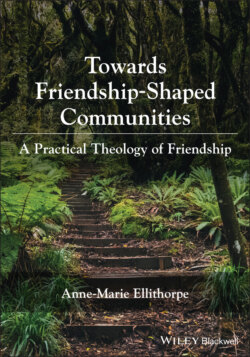Читать книгу Towards Friendship-Shaped Communities: A Practical Theology of Friendship - Anne-Marie Ellithorpe - Страница 26
What Is Friendship in Our Social World?
ОглавлениеFriendship in our contemporary world is typically assumed as a sociological fact, and not particularly well-attended to. Until recently, friendship was considered unimportant relative to the key issues that characterized the comparatively young discipline of sociology. Friendship was discussed, however, by Georg Simmel, a German sociologist. Writing before the Great War, Simmel asserted that modernity is inevitably destructive of friendship, at least in the sense used in classical debates. Simmel was an admirer of friendship; he considered it to be the “purest, most transparent, most engaging form of interaction.”24 Yet as a play form of sociability, friendship was relegated to the private sphere. Simmel considered that modern people had too much to hide for friendship in the ancient sense to be possible. Rather, they were inclined towards differentiated friendships, where sympathy might bind them to one person, intellectual community to another, religion to a third, and common experiences to a fourth.25 This differentiation presented challenges when it came to self-revelation and self-concealment, with friends reciprocally refraining from “obtruding themselves” into those “interests and feelings” not included in their own relationship with a friend.26
Subsequently, while sociological literature drew attention to the potential harm of social isolation and disconnection, concern typically focused on family and community organization.27 Friendship was increasingly seen as a private relationship and a play form of sociability. Overall, the importance of friendship was disregarded amongst social scientists, until the late twentieth century. Within sociology, friendship was considered (at best) to be of short-lived importance compared with other life issues such as family and work.28
Some speculate that friendship is an endangered relationship. In contemporary Western contexts, cultural writers and sociologists (including Charles Taylor, Anthony Giddens, Zygmunt Bauman, and Jürgen Habermas) have identified a widespread crisis in relationality. We have become more alone and isolated; we are currently experiencing a crisis of friendship and community, for which there is no single cure. While we advance technologically there is growing evidence of isolation, disconnection, fears of difference, and decline in social skills such as empathy.29 A sociological study published in 2006 indicated that American personal networks had shrunk compared to two decades previously, with nearly a quarter of those surveyed having no close confidants and almost half reporting they had no one with whom they were able to discuss personal matters.30 These findings generated tremendous public and professional interest and inspired some panic, as well as scholarly debate.31
In contrast to these pessimistic perspectives, other sociologists consider friendship to be a source of social glue. British sociologists Liz Spencer and Ray Pahl argue that contemporary Western societies are not in fact made up of isolated, self-absorbed individuals. Rather, friendship has become increasingly important as “social glue” within various forms of personal communities which they define as “the microsocial world of significant others for any given individual.”32 These personal communities may be invisible and unconsciously constructed and maintained.33 For individuals who have no immediate family, or whose family has become estranged or is simply no longer local, friendship can provide a particularly invaluable form of social glue. Further, friendship can take many forms, including soulmates, helpmates, confidants, and purely sociable fun friends.
It is difficult to ascertain from the variety of social surveys undertaken whether Western people are in fact acquiring more differentiated and superficial friendships, or more life-affirming soul friendships. As Pahl asserts, while sociologists and social psychologists attempt to quantify the importance and significance of friendship for various categories of the population at different stages of the life course, they often have little knowledge of precisely what they are measuring.34 The classifications used in such surveys are typically lacking in sophistication; respondents are rarely asked what they mean by friend.35 Unsurprisingly, those who have attempted to measure “true” or “real” friendships have come back to the question of whether we are becoming more or less able to trust one another.36 Moreover, there is no simple correlation between quality and quantity of friendships. A few close friends, infrequently met, or even met digitally, may be of greater significance socially, ethically, and spiritually than large numbers of superficial friends.
